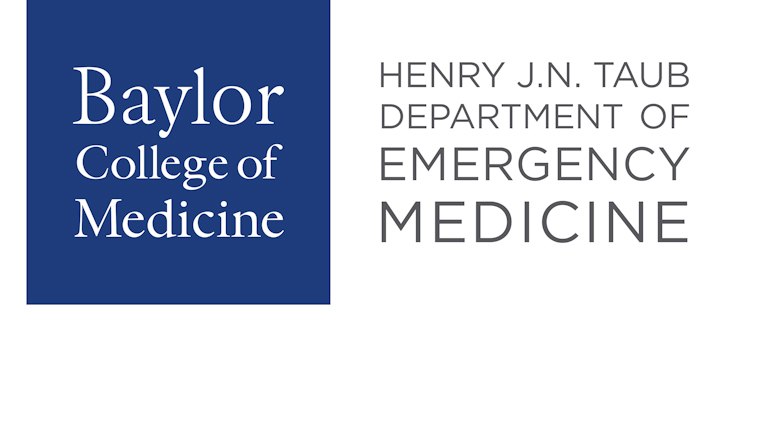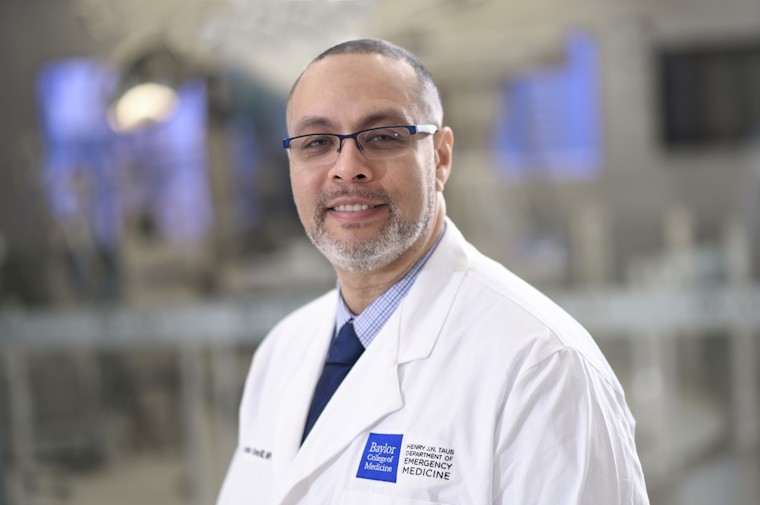This interview is one in a series of interviews with recipients of the 2024 ACGME Awards. The awardees join an outstanding group of previous honorees whose work and contributions to graduate medical education (GME) represent the best in the field. They will be honored at the ACGME Annual Educational Conference, taking place March 7-9, 2024, in Orlando, Florida.
The emergency medicine residency program in the Henry JN Taub Department of Emergency Medicine at Baylor College of Medicine in Houston, Texas is recognized with the 2024 Barbara Ross-Lee, DO Diversity, Equity, and Inclusion Award. Director, Health Equity and Community Engagement Dr. Edgardo Ordonez answered the ACGME’s questions about the program and its efforts to foster diversity, equity, and inclusion.
ACGME: Can you tell us a little bit about your Sponsoring Institution and/or program?
Dr. Ordonez: We are the emergency medicine residency program of the Henry JN Taub Department of Emergency Medicine at Baylor College of Medicine, located in Houston, Texas. We are a three-year ACGME-accredited program with 15 residents per year. Our primary sites are the renowned Ben Taub Hospital, part of Texas's largest safety net health system; Baylor St. Luke’s Hospital; and the Texas Children’s Hospital, all located in the heart of the Texas Medical Center. The residency program was founded in 2010 and has graduated emergency physicians who have gone on to practice in various academic and community settings. Many have also matched into competitive fellowship programs. Our commitment to service, education, and leadership is at the core of our residency program and department, and we strive to promote inclusive and culturally safe spaces that embrace authenticity and value the rich diversity of our community.
ACGME: Why is your institution so dedicated to the concepts of diversity, equity, and inclusion?
Ordonez: As part of a health system in the most diverse city in the US, the concepts of diversity, equity, and inclusion (DEI) are central to the ethos of our program. We are committed to the patients we serve, and we feel that a diverse physician workforce is best positioned to care for this diverse patient population. However, our commitment goes beyond representation; it extends to fostering an environment where we excel in providing high-quality, culturally responsive, equitable, patient-centered care.
ACGME: What work or initiative are you specifically being recognized for?
Ordonez: Our program is being recognized for its entire body of work in DEI. While we have excelled in our concerted efforts to recruit underrepresented in medicine (UIM) groups as faculty members and residents in our program, our program values all dimensions of diversity. We have led initiatives such as our Gender Equity Summit and hosted various cultural inclusion and belonging events. We have also increased our health equity and DEI research footprint and developed long-standing partnerships with community organizations. All these initiatives are part of our shared commitment to health equity and improving health outcomes for our patients.
ACGME: Could you explain what that work looks like?
Ordonez: One thing we feel that is important is that DEI work should be inclusive of all members of one’s departmental community. This includes faculty members, advanced practice providers, residents, and staff members. Our department created a Division of Health Equity and Community Engagement that houses the Justice, Equity, Diversity, and Inclusion Committee. Our committee consists of five pillars: 1) Educational Initiatives and Training; 2) Health Equity Research and Quality Initiatives; 3) Recruitment and Retention; 4) Community Engagement; and 5) Inclusion and Belonging.
As part of previous program evaluations, we have intentionally integrated discussions on the structural drivers of health into our resident didactics. Our longitudinal curriculum includes coverage of 18 themes that address health equity concepts. Much of our research and quality initiatives also address health inequities in historically marginalized populations. Faculty members and residents have co-led many of these initiatives, and our department has provided dedicated funding for these projects. Our program has consistently been recognized as one of the top emergency medicine programs in recruiting UIM residents. The diversity of our program goes beyond what is seen on our website. We ensure that our residents are provided many opportunities for personal growth during their education and training through mentorship, opportunities for involvement in our various mission areas, and support for professional development. To impact our community outside the walls of the emergency department, we have partnered with several community organizations and are developing a community advisory board to help plan our future initiatives. Lastly, our inclusion and belonging initiatives include regularly scheduled messaging and programs that celebrate the rich diversity of our department and community.
ACGME: How has this work helped make your institution more diverse and/or inclusive?
Ordonez: We have been a model program for the institution and have collaborated with other departments and institutional leadership to share best practices. As for our program, we have developed a reputation as one of the outstanding programs in terms of diversity. Applicants consistently bring up our continued commitment to the principles of DEI as to why our program is on their list of potential residency locations. Our department understands the importance of a supportive clinical learning environment that cultivates a sense of belonging, and it’s why we match many residents who continue to foster these values.
ACGME: How could others use your work as a model to become more diverse and inclusive? What advice do you give to GME leaders who are looking to do just that, but aren’t sure how to start?
Ordonez: We feel that, first and foremost, programs need to be intentional. Buy-in from the institution, department, and program is critical in moving the needle. Just as many other initiatives within organizational mission areas, it requires strategic planning to move forward. Conducting a needs assessment requires candid conversations about the current state to identify areas for improvement. We did this through an “Equity Action Plan” that was implemented by our institution for all departments. Engaging stakeholders is critical and should involve faculty members, residents, and other staff members who are involved in the day-to-day operations of your department and program. As with other initiatives, establishing clear goals and objectives for what DEI can and should look like is vital for measuring outcomes. It’s also essential to regularly assess progress and make necessary adjustments, which should already be part of yearly program evaluation. Lastly, and this is often overlooked, DEI work requires dedicated funding for initiatives and must include protected time and support for individuals leading these efforts.
ACGME: Is there anything you would like to say that I haven’t already asked?
Ordonez: It’s been clear how important DEI is for the well-being of our faculty members and residents and our shared commitment to better health outcomes for our patients. However, it’s important to highlight that the responsibilities of DEI work shouldn’t be placed solely on the shoulders of minoritized individuals. Diversity, equity, and inclusion benefit everyone, but the minority tax is real. Now, more than ever, with the myriad of state-led legislative barriers pertaining to DEI efforts, it needs to be a collective effort. Lastly, we would like to express our sincere gratitude to the ACGME for this recognition and its continued work advancing DEI in GME.
Learn more about the ACGME’s Barbara Ross-Lee, DO Diversity, Equity, and Inclusion Award and nominate a deserving Sponsoring Institution, program, or organization for the 2025 Award – nominations are due by March 27, 2024.




